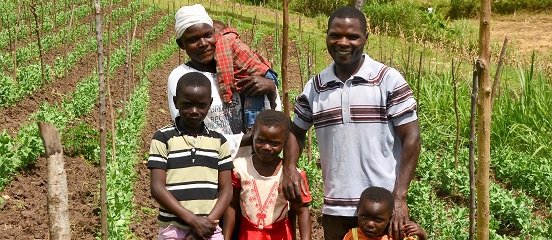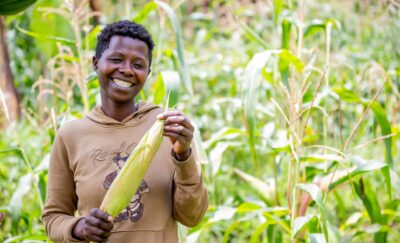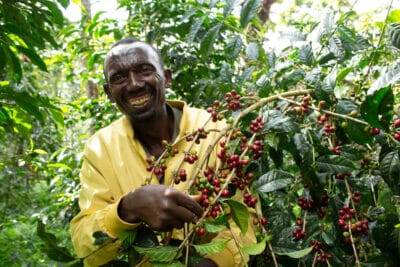News
21 December 2017
Joshua and the beanstalk: a tale of a brighter future

A 10-minute drive from Chesubet town in Elgeyo Marakwet County leads to Joshua Etyang’s homestead. The brown pig grazing outside grunts as if to notify Maximilla, Joshua’s wife, of our arrival. We can see Joshua from afar, busy on the farm, carefully weeding his one-month-old sugar snaps that are already lush green.
Two years ago when he specialised solely in maize farming, Joshua Etyang could barely meet the basic necessities of his family with the four 90 kg sacks he’d harvest after six months. This would force him to take up casual jobs on neighbours’ farms to supplement the family’s meagre income.
It’s now one and a half years since he joined the Tugumo Youth Group and was trained by Farm Africa’s Growing Futures project in the production of horticultural crops such as French beans, sugar snaps, snow peas, garden peas and cabbages. He terms this as the best decision he ever made as it has given him a new lease of life economically.
“I started working with Growing Futures in June 2016 and the journey has been worthwhile. I now have a consistent weekly income whenever harvesting commences, meaning I am able to take care of my family without resorting to working on people’s farms for pay. My household is now happy since we can comfortably afford the basic needs we couldn’t buy before,” observes Joshua.
He has now planted 10 kg of sugar snaps on his 0.5 acre farm, and expects to start harvesting the crop by mid-December 2017. He used Kshs 30,000 as start-up capital to purchase inputs such as certified seeds, fertiliser and pesticides. “If all goes well, I am expecting a harvest of 2.5 tons, which I am likely to sell at the current market rate of Kshs 80 per kg,” he notes.
He also recently planted 6 kg of snow peas and 3 kg of French beans in another half an acre, which is expected to be ready for harvest in three months’ time. He hires about five labourers to assist him during harvesting since the task is too daunting for him and his wife to handle on their own.
The main challenge he faces is inadequate capital to buy enough inputs, and parasites such as aphids during the sunny season and cutworm, which wreaks havoc when left uncontrolled. Excess water during the rainy season has also been a challenge but he has since learnt how to regulate it after lots of training.
“We were taken for an exchange visit in Oloitokitok and grasped meaningful insights on containing run-off water, furrow irrigation and making the best out of small pieces of land for maximum output,” says Joshua. He credits Farm Africa as being instrumental in honing his skills in record keeping, farm management and business plan formulation.
Joshua’s long-term plan is to increase his farming land to five to six acres so that he can grow French beans and sugar snaps at a larger scale. This will be feasible since his locality has plenty of water and he has a generator supplied by Farm Africa that he can use to power his irrigation system. “I will also train my children on the basics of horticultural production for ease of succession,” he says.
“My wife is glad that we took this route since our lives have been transformed considerably. Paying school fees for my two school-going children is no longer a hurdle as we can easily foot that. “We have since bought a dairy cow that supplies us with milk and a pig. I am able to buy all the essential household items for my family,” concludes a grinning Maximilla.




